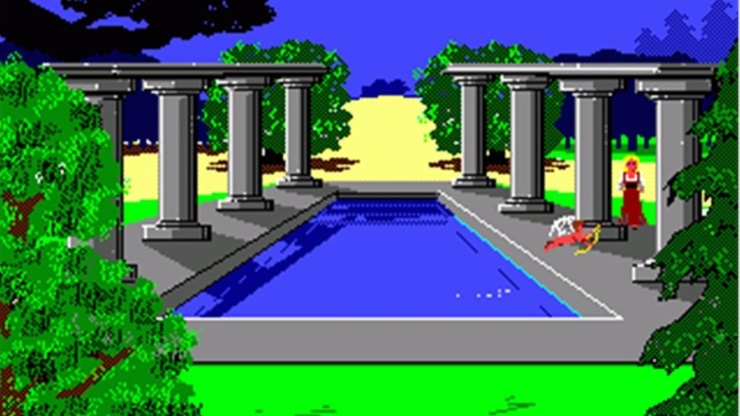When Ken and Roberta Williams were awarded with their honorary award at the video game awards at the start of December, it is likely that the vast majority of modern gamers asked a collective “who?”. The same could sadly also be said for many gamers earlier this year when Activision announced that hey would be reviving Sierra as a publishing arm of the company. Many who actually did recognise the name of Sierra were more likely to associate it with such forgettable titles as Timeshift, or the terrible Leisure Suit Larry console games that were released in the early 2000s – a publisher responsible for out-sourcing unsuccessful titles.
But the Sierra On-Line that I (and many other longtime gaming fans) remember was a very different company. Founded by the aforementioned husband and wife team back in 1979, Sierra became synonymous with the graphic adventure genre – being the first company to actually combine graphics with traditional text-based adventure games. The company was built on the success of King’s Quest – the brainchild of Roberta – although many more hits followed in its wake, such as the Police Quest series, many Space Quest titles and the risqué Leisure Suit Larry series.
By adding an on-screen character sprite to a graphic adventure game for the first time, King’s Quest revolutionised the genre. It was a death knell of classic text-based adventures, and that sub-genre was soon forgotten. The SCI game engine Sierra developed especially for King’s Quest allowed players to directly control the movement of their protagonist through different scenes in the game world, gathering items, speaking to other characters and solving puzzles using a simple text parser system. USE BROOM, GET SWORD or LOOK AT MAN was about as advanced as it got, but this was the most interactive adventure that gamers had ever experienced at the time.

The titles published by Sierra were full of humour, suspense and action, whether that be trying to silently escape from a band of Space Pirates, attempting to win the heart of the girl of your dreams, or writing up a speeding ticket for a small-time criminal. These games immersed the player in another world and let you take on the role of hero, wannabe-lothario or beat cop, for instance. They were also really challenging titles. The company garnered a reputation for creating difficult games where death lurked around every corner if you weren’t careful (often even if you were).
The idea of save early, save often was spawned – whereby players knew they should create multiple save games throughout a game, just in case they made a mistake and didn’t want to lose too much progress. There were a lot of irritating sequences and painful dead-ends in Sierra games, that not only became their trademark but also one of their selling points. Players wanted to see how many crazy ways their character could be killed and what humorous reprimands they might be treated to as they failed yet again. And the protagonists were so likeable – even when they were losers – that gamers cared what was going to happen in their story, and wanted to play the next chapter.
Sierra were innovators, and never wanted to stay still. Their adventure games moved to point and click mouse control shortly after the technology caught on, and were one of the first development studios to create games entirely using entire voice casts, or full motion video (back when FMV was thought of as impressive and new, rather than clunky and silly) with titles like Phantasmagoria – the first million-selling video game ever made. Even when the rise of 3D gaming seemed to cause a decline in adventure games in the late nineteen-nineties, Sierra tried to evolve and threw themselves into developing fully three-dimensional adventures for the first time. They may not have achieved the same success as previous releases, but showed that Sierra weren’t afraid to embrace new technologies.
 In fact, the name Sierra On-Line was very apt as the company was one of the very first to embrace internet connectivity. Sierra ran chat rooms and gaming lobbies long before most gamers even knew what that meant – with their early card game collections and such including network play years before it was in vogue. The company was sadly crippled by over-expansion, repeated buy-outs and a major fraud case throughout the late nineties and early 2000′s, which led to their early extraction from the development side of gaming, to become a publishing house. Even then, they knew how to pick a hit, with Homeworld and Half-Life two of their publishing success stories.
In fact, the name Sierra On-Line was very apt as the company was one of the very first to embrace internet connectivity. Sierra ran chat rooms and gaming lobbies long before most gamers even knew what that meant – with their early card game collections and such including network play years before it was in vogue. The company was sadly crippled by over-expansion, repeated buy-outs and a major fraud case throughout the late nineties and early 2000′s, which led to their early extraction from the development side of gaming, to become a publishing house. Even then, they knew how to pick a hit, with Homeworld and Half-Life two of their publishing success stories.
It was incredibly sad to the collapse of this company who helped forge new paths and bring so much innovation to the table. Slowly they were marginalised by and more by successive buy-outs and mergers, until they were inevitably closed completely in late 2008. Not only did that signal the end of an era for the company, but also for such iconic games designers as Roberta Williams herself, Al Lowe, and the two Guys from Andromeda, amongst others – people who really shaped the point and click genre radically and had more to give, were it not for the untimely demise of the company.
And so it is with mixed feelings that I greet the first footage from King’s Quest: Your Legacy Awaits – the new re-imagining of the classic series by indie developers The Odd Gentlemen (of P.B. Winter bottom fame). Happiness because of the re-birth of a company that I grew up with, and which provided me with some of my earliest – and best gaming memories. But also with sadness and trepidation, that the iconic graphic adventure seems to have been turned into an action-adventure, platforming title. It looks graphically impressive, but remains to be seen whether it will recapture the core exploration and puzzling gameplay elements, or the spirit and atmosphere of those early, ground-breaking games that came before it. Ken and Roberta Williams really did give a lot to the gaming industry, and I only hope that the re-launch of the Sierra brand can do at least a little justice to their legacy.

No comments:
Post a Comment
Agree, disagree or have any other opinion? Let me know what you think!